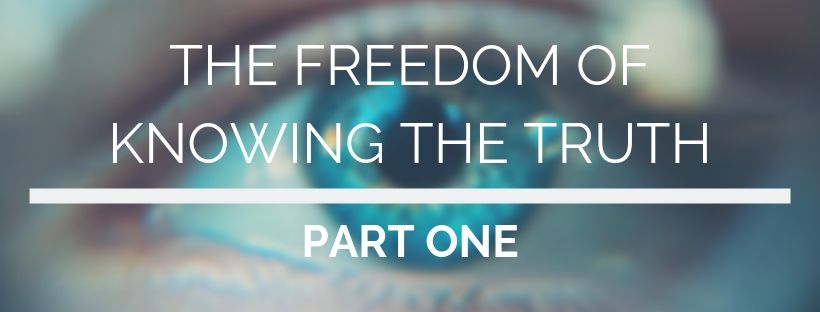The Freedom of Knowing the Truth – Part 1

“And you will know the truth, and the truth will make you free.”
These familiar words of Jesus are found in chapter 8 and verse 32 of John’s Gospel. They are known to Christian and non-Christians alike, particularly in our Western and North American culture. We see this statement displayed on the seals of colleges and universities across the land, and hear it referenced in the context of the court of law. Even some of our movies mention it, although usually in a casual, if not mocking, tone.
When we really stop to think about it, it isn’t hard to understand how a verse like this could take on such popularity over time given the concepts mentioned in the verse and our history. As a culture, we champion our ability to learn and know anything we can about the world around us through our rigorous, if not almost religious, commitment to the scientific method. We require people to “tell the truth, the whole truth, and nothing but the truth” under threat of conviction and punishment if they do not. And, our country was born out of a desire to be free from tyrannical oppression.
Knowledge. Truth. Freedom.
Unsurprisingly, the biblical understanding of these three concepts in this verse is often confused, denied, and, at times, attacked by the culture we live in, arguably now more than ever. They are also the concepts packed with the most theological and practical meaning for our lives. As Christians, we must first and foremost seek to understand what Jesus is saying in His Word and obey it, regardless of what the culture may think. When reading this verse in particular, we must seek to understand and obey what Jesus means when He says that if you know the truth, it will make you free.
In the first post of this series, I want to take a brief look at the concept of knowledge, and then in later posts, the concepts of truth and freedom. We will see how the different views about them within our culture contrast with what Jesus is saying here in John 8:32. So let’s dive in to the concept of knowledge.
On the positive end of the spectrum, knowledge in general and formal education in particular are seen in our culture as the first step in acquiring anything one might desire. The catchy tune of the old Schoolhouse Rock! song, “Knowledge is Power,” a supplementary staple of English and Grammar classes in elementary schools in previous decades, invites children to believe this and give themselves to the pursuit of learning. Of course, it is true that knowledge is important, desirable, and worthy of pursuit. Indeed, there are several verses in Proverbs highlighting the value of acquiring knowledge[1], an example being Proverbs 18:15, which says, “The mind of the prudent acquires knowledge, and the ear of the wise seeks knowledge.” But, does Jesus mean to say that learning anything about the world, even if it’s helpful and true and pursued with the noblest of intentions, will make one free?
More recently, however, due to the popularization of postmodern thinking in our culture, the notion that anyone can really know anything has been hotly contested, especially if it’s religious or theological in nature. Even parts of Christendom, such as the emerging church movement, have drifted into embracing the “mystery” of God while downplaying the idea that God has spoken to us in Scripture precisely so that we can know Him. Christians of course must agree that there certainly is mystery when it comes to understanding God because He is in fact bigger than us, above us, beyond us, etc. If we could comprehensively or exhaustively know God, He wouldn’t really be God; He would basically be just like one of us! But, does the fact that we as finite human beings cannot know everything about God mean that we can’t know anything about Him? At the end of the day, each one will have to decide if they believe whether or not God has revealed truth to us in the Word, and if He has, does He intend to be understood and known through that revelation? If God didn’t want to be known, then why did He reveal Himself in any form at any time?
Christians must understand that God did reveal Himself, most notably through the Living Word, His Son, the Lord Jesus Christ, and through the Scriptures, the written Word. It is to His Word that we are all accountable for every thought, word, and deed. Indeed, there is nothing more important, more consequential, or more desirable for us to know! When Jesus says in John 8:32 that knowing the truth will make you free, we can gather from the context (see John 8:31), that He is specifically referring to knowing the truth of His Word. And by knowing that truth, He doesn’t simply mean merely knowing it intellectually or academically; He means knowing it personally, relationally, and experientially. In other words, as John 8:31 says, to know the Word is to “continue” in it, that is, to live it out in everyday life because you take it as true, good, and wise.
When we continue to hear, think through, and obey the Word regularly, then, and only then, are we knowing the truth which makes us free.
In the next post of this series, we will build on what we started here by examining more about what Jesus means when He says that knowing the truth will make you free.
[1] Proverbs 10:14, 15:14, 19:2, 23:12, 24:5.
